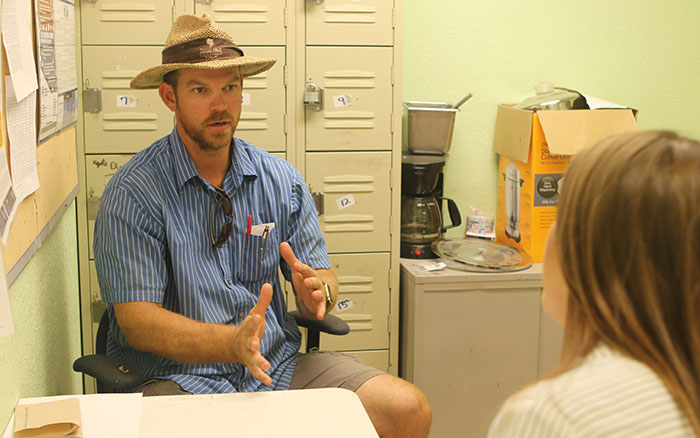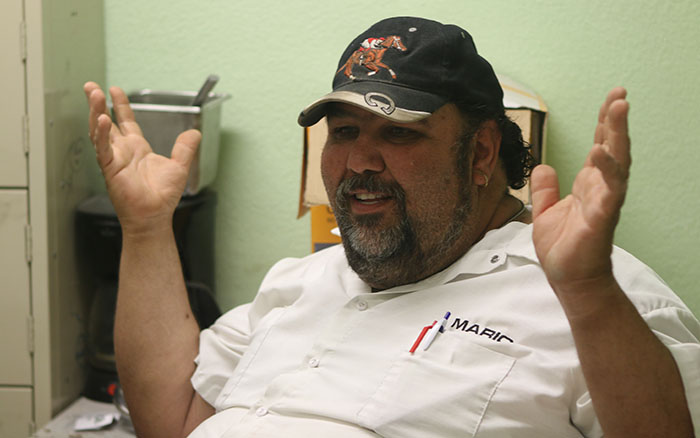- Slug BC-Border Jobs, 1,400 words
- Part of Border Poll package. w/Border Poll; Border Crossing and Border Methodology.
- Photos included.
- Graphics embed codes are on bottom of Border Poll story.
Cronkite NewsYUMA — Yuma has one of the highest unemployment rates in the country and along the U.S.-Mexico border, buttressing a Cronkite News-Univision News-Dallas Morning News poll showing that jobs and the economy, not a wall or illegal immigration, are the top concerns for residents.“It’s really hard. Jobs here don’t pay well,” said Jose Jimenez, 19, an accounting student at Arizona Western College in Yuma.
Jimenez’s struggle to find work is reflected in the poll, with 40 percent of the 700 respondents in the United States saying jobs, wages and the economy are the most important issues. In Yuma, that number is even higher at 48 percent.
The poll, with a margin of error of plus or minus 3.7 percentage points, was conducted in May by Austin-based Baselice & Associates Inc. It included questions on quality of life and cross-border relations, and was conducted in person and over the phone in both English and Spanish.Jimenez recently stopped by the MLK Youth Center to update his resume. He’s living with his mother while he searches for work.
The border city is home to roughly 200,000 people, according to data from the U.S. Census Bureau. As of April 2016, the non-seasonally adjusted unemployment rate is 18.7 percent, where it has hovered since the 2009 recession.
“What is reflected in our unemployment is a combination of things: It is the seasonality, because we are also one of the winter visitor targeted regions,” said Julie Engel, CEO of the Greater Yuma Economic Development Corporation.
“We get about a hundred thousand people in the winter, and that’s also the produce season, which is labor-intensive, so in the summer, our unemployment rate spikes,” said Engel.
The top employer in Yuma, the U.S. Army Proving Ground, which tests military-grade parachutes, employs 2,300 people. The other major employers, the Yuma Regional Medical Center and the Yuma Elementary School District, account for 4,000 jobs. One out of every four people in the area works for the government.
Engel insists that the Development Corporation has made some meaningful strides in bringing jobs to Yuma, like the addition of the cancer center at the regional hospital and growth of the hospitality industry.
“There is just a lot of different opportunities that didn’t exist five years ago and really didn’t exist 10 years ago,” she said.
Manuel Almodova, a Yuma native who retired after working heavy highway construction for 27 years, is once again searching for a job. When his wife got cancer, their hard-earned nest egg was quickly depleted.
When he was employed, he frequently traveled to job sites in other states that offered higher wages. “Most of my work was in Northern California, Southern California, Oregon, Utah; anything north of Arizona where they pay scale was higher,” he said.
Almodova sees people searching for jobs on Facebook exchange pages, where residents informally trade goods and services. Some offer up free clothing, furniture and even cars, while others use it as a new-age classified advertising page. He said that often times job seeker’s expectations do not align with the reality of Yuma.
“There are jobs, but it’s minimum wage,” he said, “Hotels, fast food, what have you; but people want to earn more than minimum pay.”
Some in Yuma are trying to create their own job opportunities. The Southwest Exchange Home and RV Superstore, owned by Idaho native Kory Kehle, sits on a dusty frontage road in the foothills about 10 minutes outside of town. Inside, you can buy everything from portable cell phone chargers to faux-Persian area rugs. Country music blares from speakers in the ceiling.
Kory Kehle discusses the challenges of running a small business in Yuma with Cronkite News reporter Selena Makrides. (Photo by Socorro Carillo/Cronkite News)
“Ever since I’ve been in business I’ve been catering to the snowbird, the traveler, the winter guest. I pay the price in the summer and I reap the benefits in the winter,” said Kehle.
Kehle opened the store in 2013, after years of selling similar wares in a seasonal open-air market down the road. He saw the chance to grow his business to a year-round enterprise by going brick-and-mortar, and said he hasn’t looked back since.
“We’ve been very fortunate that every year we do a little bit better than the year before,” he said. “We’re constantly upgrading and we’re constantly trying to improve it.”
Every industry is impacted by Yuma’s characteristic seasonality, including retail. Tourists visit for the winter months and head back to more temperate climates as summer approaches, taking their money with them.
Mario Gonzalez, seated next to Kehle in a work shirt bearing his name, has been with him since day one.
“I have a picture of the first customer from when we first started,” Gonzalez said with pride.
Gonzalez moved to Yuma from California 20 years ago at the urging of his wife, who wanted to be closer to family in Mexico. He can see the border from his house in Yuma. He travels across regularly to visit his son, daughter-in-law and grandchild. For him, the constant exchange between the United States and Mexico sides of Yuma is central to understanding the economics of the community.
Mario Gonzalez says he regularly crosses the border in San Luis to visit family in Mexico and wishes wait times were shorter. (Photo by Socorro Carillo/Cronkite News)
“If I was to go across the border and live, and I work here, my dollar is worth a lot more across that border than it is here. I’ve always told Kory, I’d live like a king over there with what I make here,” he said.
Gonzalez is among tens of thousands who spend their lives straddling the border. In 2015, almost 8 million people crossed at Port San Luis, according to data from the U.S. Department of Transportation.
John Morales of Arizona@Work, a statewide resource for would-be employers and hopeful job seekers, said one of the biggest contributors to high unemployment is “the whole educational attainment thing.” Approximately 28 percent of the workforce in Yuma has less than a high school diploma.
“Looking at the 21st century requirements of what people need, boy it’s tough around here, especially for people who don’t have an education,” Morales said. “Many people are working two jobs at minimum wage just to make ends meet.”
He said in order to get the complete economic picture, you also have to factor in systemic poverty, second language issues and a migrant work force.
Lydia Blackthunder is the youth manager at Yuma’s MLK Youth Career Center, which provides GED classes and job training to youth, aged 16 to 24. Her students have the opportunity to try their hand at a variety of fields, ranging from IT to hospitality to truck driving.
“Most of the students who come in don’t know what they want to do. They say they want to work in a specific career but they haven’t been exposed to it and are not familiar with what that career entails. They get the opportunity to explore that career,” she said.
It’s easy for young people in Yuma to be sucked into the cycle of unemployment. Blackthunder said, “They can’t get employment because they don’t have a work history,” but they can’t fill their resume without someone taking a chance on them. When you take into account lack of jobs and lack of education, their prospects seem dire.
When industries and companies consider moving to the area, they often scrutinize the labor force and evaluate its strengths and weaknesses. If industries don’t come, neither do the well-paying jobs Yuma residents so desperately want and need.
Those who do get an education often have to leave to look for work, contributing to the border’s “brain drain.”
Jimenez plans to join his brother in Pullman, Washington, in a couple of years. After he finishes studying at the community college, he wants to attend a university.
His older brother left Yuma in search of higher wages and started his own construction business. Jimenez said he feels “nervous and sad” about leaving his hometown.
“I have to go because there are not that many jobs over here,” he said.

